Ukraine, Russia trade blame for risk of nuclear disaster at frontline
plant
 Send a link to a friend
Send a link to a friend
 [August 12, 2022]
By Natalia Zinets [August 12, 2022]
By Natalia Zinets
KYIV (Reuters) - Ukraine and Russia accused
each other on Friday of risking nuclear disaster by shelling Europe's
largest nuclear power plant, occupied by Russian forces in a region
expected to become one of the next big front lines of the war.
Western countries have called for Moscow to withdraw its troops from the
Zaporizhzhia nuclear power plant, and the United Nations called on
Thursday for it to be declared a demilitarised zone. But there has been
no sign so far of Russia agreeing to move its troops out of the facility
they seized in March.
The plant dominates the south bank of a vast reservoir on the Dnipro
river that cuts across southern Ukraine. Ukrainian forces controlling
the towns and cities on the opposite bank have come under intense
bombardment from the Russian-held side.
Three civilians, including a boy, were wounded in overnight shelling of
one of those towns, Marhanets, Valentyn Reznichenko, governor of the
Dnipropetrovsk region, said in the latest in a string of similar
reports.
Kyiv has said for weeks it is planning a counteroffensive to recapture
Zaporizhzhia and neighbouring Kherson provinces, the largest part of the
territory Russia seized after its Feb. 24 invasion still in Russian
hands. Moscow has installed regional officials who say they intend to
stage votes to join Russia.

Ukraine's Energoatom agency, whose workers still operate the plant under
Russian occupation, said the power station was struck five times on
Thursday, including near where radioactive materials are stored. Both
sides blamed each other for the blasts and Reuters could not verify
either account.
Russia says Ukraine is recklessly firing at the plant. Kyiv says Russian
troops struck it themselves, and are also using the plant as a shield to
provide cover while they bombard nearby Ukrainian-held towns and cities.
"The Ukrainian Armed Forces do not damage the infrastructure (of the
plant), do not strike where there may be a danger on a global scale. We
understand that the invaders are hiding behind such a shield because it
is not possible to strike there," Natalia Humeniuk, spokesperson for
Ukraine's southern military command, told Ukrainian national television.
The U.N. Security Council, where Russia wields a veto, met on Thursday
to discuss the situation. Secretary-General Antonio Guterres called on
both sides to stop all fighting near the plant.
"The facility must not be used as part of any military operation.
Instead, urgent agreement is needed at a technical level on a safe
perimeter of demilitarisation to ensure the safety of the area,"
Guterres said in a statement.
At the Security Council meeting, the United States backed the call for a
demilitarised zone and urged the International Atomic Energy Agency (IAEA)
to visit the site.
Russia's U.N. Ambassador Vassily Nebenzia said the world was being
pushed "to the brink of nuclear catastrophe", comparable in scale with
the 1986 Chornobyl disaster in then-Soviet Ukraine. He said IAEA
officials could visit the site as soon as this month.
[to top of second column]
|

Russia and Ukraine accused each other of
shelling Europe's biggest nuclear power plant as the U.N. chief
proposed a demilitarized zone at the site amid fears of a
catastrophe. This report produced by Jillian Kitchener.

Ukrainian President Volodymyr Zelenskiy demanded Russia return the
plant to Ukraine's control.
"Only a full withdrawal of the Russians ... and the restoration of
full Ukrainian control of the situation around the station can
guarantee a resumption of nuclear security for all of Europe," he
said in a video address.
France echoed Zelenskiy's demand and said Russia's occupation of the
site endangered the world.
"The presence and actions of the Russian armed forces near the plant
significantly increase the risk of an accident with potentially
devastating consequences," the French foreign ministry said in a
statement.
DEVASTATION AT RUSSIAN BASE
The main Ukrainian front lines have been comparatively static in
recent weeks, but fighting has been intensifying lately in
anticipation of what Ukraine says is a planned counter-offensive in
the south.
Ukraine's General Staff on Friday reported widespread shelling and
air attacks by Russian forces on scores of towns and military bases,
especially in the east where Russia is trying to expand territory
held on behalf of separatist proxies.
Pavlo Kyrylenko, governor of the eastern Donetsk region, said on
Telegram seven civilians had been killed and 14 wounded in the past
24 hours.
Kyiv hopes that by acquiring new missiles capable of striking
Russian logistics deep behind the front lines, it can turn the tide
of the conflict in coming weeks.
Satellite pictures released on Thursday showed devastation at an air
base deep in Russian-annexed Crimea, struck on Tuesday in what
appeared to be some form of attack, although Kyiv has not claimed
responsibility or explained how it was carried out.
Images from independent satellite firm Planet Labs showed three
nearly identical craters in buildings at Russia's Saki air base. The
base, on the southwest coast of Crimea, suffered extensive fire
damage with at least eight destroyed warplanes visible.

Russia has denied aircraft were damaged and said explosions at the
base were accidental. Kyiv neither confirmed nor denied any role in
the blasts, but noted that the initial explosions took place
simultaneously hundreds of metres apart, which would appear to rule
out an accident.
The base is beyond the range of advanced U.S. rockets Ukraine has
deployed since last month, but within the range of more powerful
versions that Kyiv has requested from the West.
(Additional reporting by Reuters bureaux; writing by Peter Graff;
editing by Philippa Fletcher)
[© 2022 Thomson Reuters. All rights
reserved.]
This material may not be published,
broadcast, rewritten or redistributed.
Thompson Reuters is solely responsible for this content. |